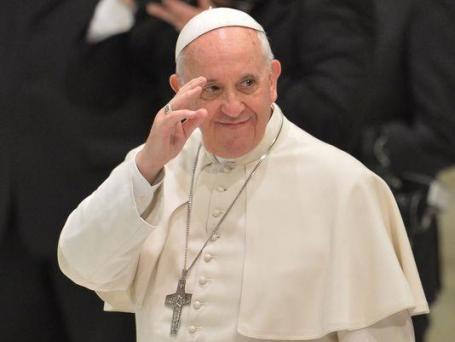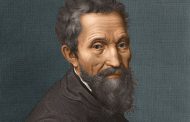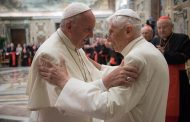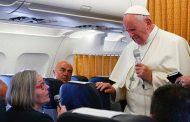For Brad Bingham, a lifelong Catholic who regularly goes to confession, it was the new pope’s own confession — “I am a sinner.”
For Erin McHugh, a college student with a heart for the poor, it was the pope’s decision not to live in the Apostolic palace, but in a less opulent guest house in the Vatican.
For David Siler, who shares a passion for the poor and those on society’s edge, it was the pope’s warm embrace of a man whose face was disfigured by disease.
For Catholics around Indiana, the first year in the pontificate of Pope Francis was punctuated by poignant moments, events that seem to point to a man who lives as a humble priest even as he occupies a throne in a church with a billion adherents. From riding the bus, to carrying his own suitcase, to rumors he sneaks out at night to serve the poor, Francis in his first year has captured the imagination of the Hoosier faithful — and others — in ways his recent predecessors have not.
The approach has invigorated those who serve the poor, prompted an increase in prayer and financial giving and — while it has not yet translated into higher Mass attendance — created a buzz of excitement in the church.
At the same time, what many people seem to like about Pope Francis — that he’s more welcoming toward gays, non-believers and others estranged from the church, and that he’s broadening the Catholic social agenda beyond abortion — is giving social conservatives some pause for concern.
“I think there’s a lot of enthusiasm for him, for Francis. These gestures speak to people,” said Indianapolis Archbishop Joseph Tobin. “I’ve also run into some anxiety because there are people who feel that: ‘Is he changing what seemed to be unchangeable? Is he backtracking on Christian morality?’ “
The short answer to that question, Tobin says, is no. This is not a pope who’s likely to allow women to be priests or to change the church’s stance on abortion or to approve same-sex marriages. But Francis is changing the way Catholic doctrine is presented. And as far as Tobin’s concerned, “That’s not a bad thing.”
A prime example was Francis’ comments on homosexuality in the priesthood. Church teaching considers homosexual behavior a sin. His immediate predecessor, Pope Benedict XVI, called it an “intrinsic evil.” But Francis left open the door for priests who do not act upon gay tendencies, going so far as to say, “Who am I to judge?”
Tobin said leaving judgment to God is “good theology and it goes back to the words of Jesus.” Above all, Tobin said the anecdote is revealing of a key aspect of Francis’ approach: “I think his default mode is to teach what the church teaches, not what it is against.”
That shift is welcome by many, with 85 percent of American Catholics giving Pope Francis a favorable rating for his first year and 71 percent saying he represents a major change in the direction of the church, says Pew Research.
“I feel he’s kind of given Catholicism a new face,” said Sister Ann Casper, a member of the Sisters of Providence, a religious order based northwest of Terre Haute. “I think so often it is portrayed in the press that our religion is a condemning one. And I think he’s made it more of what Jesus proclaimed — and that is to reach out to the poor and the marginalized.”
Forging a connection
Bingham, who attends a church in Evansville and occasionally in Indianapolis while here on business, said he appreciates Francis’ broader scope. Coupled with his humility, it has made the papacy seem less remote, less on a pedestal. “It is the first time in my life that I’ve really felt a connection to the pope. It is just the way he has chosen to live his life since becoming pope that I think provides an example.”
A Zogby survey found that nearly one-fourth of Catholics have increased their chartiable giving in the past year, most saying the increase was inspired by Francis. Pew surveys report that Catholics are more excited about their faith and praying more — but attending Mass at about the same frequency.
The so-called “Francis effect” could take time to translate to Mass attendance, said Lawrence Cunningham, a church historian at the University of Notre Dame and the Emeritus John A. O’Brien Professor of Theology. But he sees something new at work.
“There is something that is almost automatically attractive about people who are deeply virtuous but don’t seem to be virtuous, don’t seem to be walking around with a halo over their head,” Cunningham said. “I think his honesty, his integrity, his deep faith, becomes magnified and emphasized in the mass media and I think people are attracted to that.”
Providing some space
In a secular world where gay civil unions and gay marriage are becoming more common, where couples frequently live together before marriage, this pope seems interested in finding ways for the church to reach out to those who haven’t felt welcomed in the past. And unlike his predecessors, Cunningham said, Francis isn’t the kind of leader who responds to such challenges with a quick, “No. Subject closed.”
“Anyone who thinks he is going to change basic doctrine or moral issues in the church just doesn’t understand the Catholic world or Catholic theology very much,” Cunningham said. “What I do think that he does, though, because he has a certain openness, is going to provide what I would call space.”
Not everyone is comfortable with that kind of space.
Rita Beck, a socially conservative Catholic from Greenwood, said she thinks Francis has “a heart of gold” but she speaks almost wistfully about how crystal clear his predecessors, such as Pope John Paul II, could be on social issues. She worries that a liberal media could exploit the space Francis has created. “I would like him to define more of what he said,” Beck said, “so nobody can twist his words.”
Tobin, the archbishop, said a Baptist leader who heard him speak at an interdenominational prayer meeting thanked him for clarifying Pope Francis’ remarks on atheists, which some interpreted to mean even non-believers could get to heaven. “They were starting to believe (Francis) was the anti-Christ,” Tobin said, “because he was turning his back on Jesus as savior.”
Rev. Jeff Godecker, who ministers to Catholic students at Butler University, said Pope Francis may not feel the need to hammer away at certain issues the way other popes have.
“Who doesn’t know what the position of the Catholic Church is on abortion?” Godecker said. “I certainly think the pope is right that that shouldn’t be all of the conversation that we have in the church. There are other issues.”
What’s clear to everyone is that Francis has infused the church with a new energy.
A visible pride in service
Siler, who is executive director of Catholic Charities for the Archdiocese of Indianapolis, sees some new spring in the steps of his staff and volunteers who serve the homeless, help resettle refugees and intervene on behalf of the poorest of the poor — just because of the emphasis Pope Francis has placed upon serving others.
“Every chance at the water cooler there’s almost always a conversation about something Pope Francis has said or written or done. It’s just so encouraging for everybody,” Siler said. “You’d think people are walking with their heads held up a little bit higher because our leader has put such an importance on it.”
Among the directives Francis has given to priests is that they should be “shepherds living with the smell of the sheep” — in other words they should get their hands dirty serving those in need. Those words had a special ring of truth to Rev. Larry Janezic, an Indianapolis pastor.
Janezic, who spent time in Chicago working directly with the homeless, said the decades Francis spent as a pastor to the poor is now carrying over to his work as pope, and is inspiring Janezic anew. “It affirms my interest in ministry and the direction I want to take it – being open to people and caring for the poor, being a merciful and reconcilable presence rather than a judgmental presence.”
As for the church’s change in tone under Francis, Janezic said: “I suspect that a lot of priests who hear confessions and are pastors in parishes appreciate that tone — understanding, not judgmental, reconciling, loving. I think those things are our strength.”
For more info:





